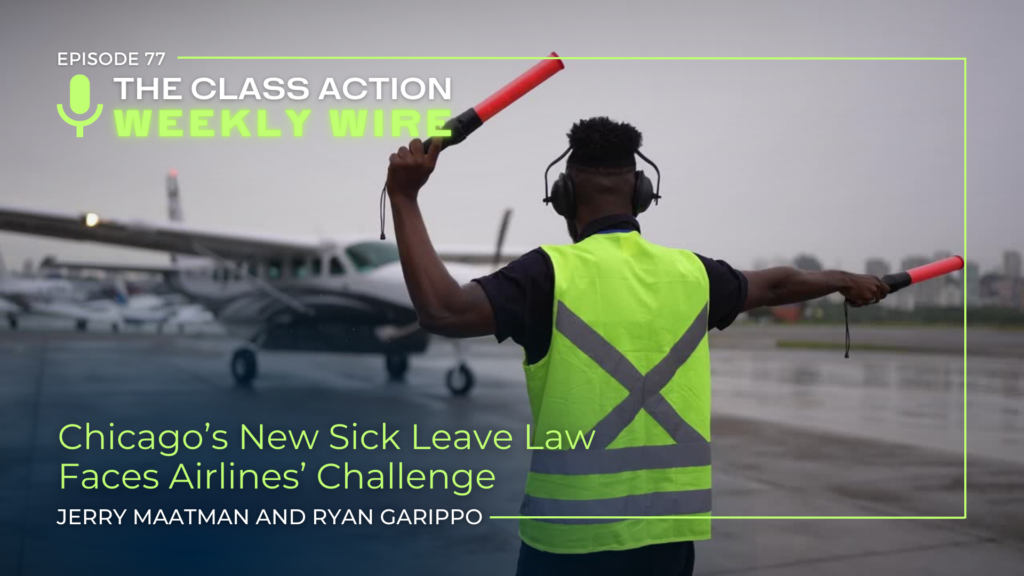
Duane Morris Takeaway: This week’s episode of the Class Action Weekly Wire features Duane Morris partner Jerry Maatman and associate Ryan Garippo with their discussion of a recent lawsuit challenging the implementation of the Chicago Paid Leave and Paid Sick and Safe Leave Ordinance, which took effect in July 2024, alleging the statute would impact flight prices and routes – hindering airlines’ ability to provide services.
Check out today’s episode and subscribe to our show from your preferred podcast platform: Spotify, Amazon Music, Apple Podcasts, Samsung Podcasts, Podcast Index, Tune In, Listen Notes, iHeartRadio, Deezer, and YouTube.
Episode Transcript
Jerry Maatman: Thank you. Loyal blog readers and listeners. My name is Jerry Maatman of Duane Morris, and welcome to our weekly podcast series, entitled The Class Action Weekly Wire. I’m joined today by Ryan Garippo, one of my colleagues, who’s here to discuss some cutting-edge litigation in the U.S. District Court for the Northern District of Illinois. Welcome, Ryan.
Ryan Garippo: Great to be here, Jerry. Thanks for having me.
Jerry: We wanted to talk about a lawsuit brought by an organization known as the Air Transportation Association of America, in response to a new law passed by the City of Chicago requiring paid sick leave. The law is being challenged, a law that went into effect on July 1, which requires that employers provide workers with up to 40 hours of paid sick leave (and up to 40 hours of paid leave) that can be used for any reason and at any time. Ryan, what’s this lawsuit all about and why is it important for companies?
Ryan: Well, Jerry, it’s a really interesting case. The plaintiffs in this case alleged that the municipal ordinance, the Chicago Paid Leave and Paid Sick and Safe Leave Ordinance, cannot be enforced against airlines because it interferes with flight crew staffing and scheduling in violation of federal law and their collective bargaining agreements. Here, the airline lobbying group stated that the new regulation is preempted by the ADA, or the Airline Deregulation Act, and the Railway Labor Act. These are laws that removed federal government control over the industry to allow the market to influence economic decisions like fares, routes, schedules, and services. The law also prohibited state and local governments from enacting or enforcing a law or regulation having the force and effect of law related to price, route, or service of an air carrier. The plaintiffs have argued that this ordinance would do exactly that.
Jerry: Well, thank you for setting the scene. That’s a very interesting lineup of issues and litigants. My understanding is the lawsuit was filed against Kenneth Meyer, who’s the Commissioner of Chicago’s Department of Business Affairs and Consumer Protection – why is it that this association sued the city or the chair of this agency?
Ryan: Well, this the organization sued Mr. Meyer because he’s the one who enforces the law. He argued that the law is not preempted at the ADA because it regulates airline employees – and not the price, routes, or services. Mr. Meyer also contended that the ordinance’s regulations of employees would not cause airlines’ labor costs to increase, but the costs are just one of many inputs that impact an airline’s customer facing services and are too far removed to be preempted. Mr. Meyer also stated that the ordinance was not preempted by the Railway Labor Act because it did not involve the collective bargaining process and did not trigger that interpretation of the collective bargaining agreement. He also argued that the ordinance simply established minimum labor practices within the city.
Jerry: So, in essence, the association was challenging the viability of this law and whether or not it could stay on the books. How did the association respond then to the city’s motion to dismiss after it was filed?
Ryan: Understandably, they argue that the motion should be denied. They argued that the ordinance does undermine the airline’s ability to organize with its employees, and that it would result in the employees ultimately misusing the ordinance by taking sick leave more frequently and on shorter notice. This possibility, according to the plaintiff, means that the ordinance is preempted by the ADA because the Act removed the federal government’s control over the industry to allow the market to influence decisions like fares, routes, schedules, and services. They also contend that a certain number of the flight attendants must be on a plane for the airline to allow passengers to start boarding, and if more employees are misusing the ordinance, then the airline will be forced to spend time searching for potential replacements for flight attendants when they call out abruptly on sick leave which will lead to potential delays, cancellations, and will ultimately impact routes and fares. Well, now that the motion is fully briefed, we’ll keep our eyes out for a ruling from the court.
Jerry: This reminds me of kind of the post-COVID situation, where hundreds, if not thousands, of cities and municipalities enacted leave laws, including the sick leave law that you’ve described, so that employers, especially those operating in multiple states, have to deal with a patchwork quilt of obligations when it comes to leave laws such as at the federal level, state level, and even the city level. So a very vexing, challenging area for employers. And this is a key ruling that everyone will want to keep uppermost in their mind in terms of trying to figure out how to comply with that patchwork quilt. Well, thanks, Ryan, for lending your expertise and thought leadership and joining us for this week’s podcast.
Ryan: Happy to be here. Thanks everyone.
